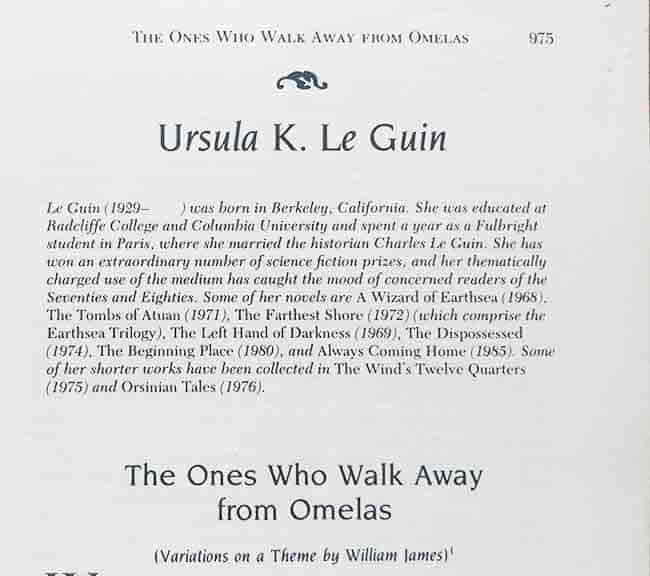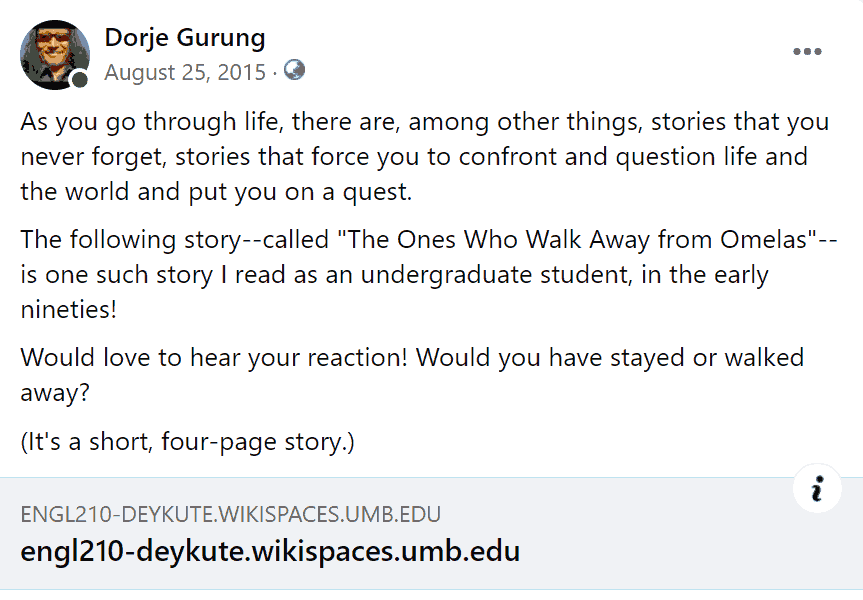
Locating, restoring and recompiling my digital records and documents, following crashes of two of my external hard disks, I have come across many documents that I hadn’t viewed in a long time. Among them are the papers I wrote for different classes as an undergraduate student at Grinnell College in the United States of America between 1990 and 1994. I have decided to reproduce some of them here in my personal blog.
The paper below is one I wrote for my literature class. It’s an analysis of a highly philosophical short story The Ones Who Walk Away from Omelas by Ursula K. Le Guin. Click here for an online version of it.
This assignment ended up meaning a lot more to me personally. As a matter of fact, I chose to write about the story because it forced me to think deeply about the particular human conditions and the choices we make about our lives and that of others, deliberately or not. In fact, the story stayed with me–including literally (see header image)–all the while since then forcing me to periodically ask myself the question I had asked then: “Would you walk away?” The question also, in time, morphed into, “Can you walk away?”
And when in 2015 I happen to come across the story online, I made the following post on Facebook. (The link no longer works.)

If you read the story, you’ll also ask yourself the same question. What would you have done and why?
* * * * * * * *
Dorje Gurung
Box 06-10
Fundamentals of Literary Analysis
Prof. Christine Loflin
4. Analyze a story of your own choice other than the ones we’ve read in class (unless you have a new reading). Consider point of view, structure, style, theme–any of the characteristics of short story writing we have been considering in class.
The Ones Who Walk Away from Omelas
In “The Ones Who Walk Away from Omelas”, happiness is asserted to be here and now, and something we do not have to go somewhere else to find. Happiness is not something of the past and something “stupid”. It “is based on a just discrimination of what is necessary, what is neither necessary nor destructive, and what is destructive.” What is necessary constitutes of not just elements that bring us joy but also the other side of joy–sorrow and suffering–so that we appreciate life more and live life to the fullest.
Omelas, as described, is a perfect place–a paradise. It has a good location. The mountains and the sea are there. Summer has just begun and the “Festival of Summer” is in progress. The boats in the harbor; the colored roofs and the painted walls; the music in the air; the people in the procession; the people dancing in the streets; the children readying the horses; even the horses all decorated and festive; and the air too resounding of joy and happiness….all is joy.
The detailed description of Omelas makes one wonder if it is a place in some far off unreachable land in the past. Is Omelas heaven? Or a mythological state? Or a fairy tale town?–one is tempted to ask. The tendency to associate joy and happiness with the fairies in the myths, and the people of the past who lived completely immersed in the nature, the “noble savages”, induces people “to make certain assumptions” about such a place as Omelas. One of the assumptions being that it must not have any of the conveniences available in a twentieth century civilization.
However, we are not justified in making those assumptions! It is a flaw in our way of thinking to associate happiness and joy with the fairies and the “noble savages” and think of “happiness as something … stupid.” The assumptions are not valid.
No, Omelas is not something distant and of the past. It is just like any other city. It does not have a King and slaves like in the happy mythological states. It has trains, and laws like any other place. However, it does not have any “stock exchange, …advertisement[s], …secret police, and …bomb.” Many amenities that are the trademarks of a civilized twentieth century place–like central heating systems and washing machines–could well have been in it too! Whether it has all of that material conveniences is of little consequence; “It does not matter” whether it has them or not! What is more important is that it is so much like many places that we have seen. It is some place that we can imagine.
The people are not simple like the “noble savages” and shepherds are. “They are not naive and happy children.” They are sophisticated and complex people. Without the advertisements, stock markets and the bomb and some other characteristics of this century, they do appear to be less developed. The people themselves are not that different though! They are “mature intelligent, passionate” people just like many of us. “They aren’t barbarians.” The difference is that “we have almost lost hold” of the way of describing a happy man, nor is there a simple joy in a celebration anymore. Intellectualization of what happens and what is done is carried out to such an extent that human feelings are simply not expressed, and as a result, a simple expression and experience of them are seen as something outside the domain of human endeavor. Despite that, we can imagine people like those who live in Omelas–full of joy and happiness. Another important aspect of Omelas is the absence of guilt among the people living there.
Omelas has it’s other side too–the lone child in a small room. A child left to suffer and bear the brunt of all miseries. A child that has to suffer in order for all the happiness and prosperity to exist and continue to exist. A child that has to suffer for the good of the many in the town of Omelas. One could ask how is that humanely possible? On close examination, we find the juxtaposition of such suffering and happiness not very unusual. We have all encountered them. It is something that we can all relate to. After all, suffering is part of happiness. It is something no one in Omelas can change. Nothing anyone can do will change the condition of the child. There are those who do find some discomfort on finding that they are helpless about the situation of the child. However, it is their sense of giving themselves up to what is reality and the justice of reality that enables them to see their life with a greater sense of value. There is a greater feeling for life. That is precisely why such happiness is possible in Omelas.
And then, there are those who leave Omelas because they cannot accept the destiny of the child made to suffer. Their feeling of helplessness overpowers them. Unable to accept the situation, they choose to leave Omelas instead. They walk away from Omelas heading toward some destination only they seem to know. “…[T]hey walk straight into the darkness” and “do not come back.” As human beings, we don’t have the capability to imagine accurately what lies beyond life here and now. The ones who walk away from Omelas could be seen as walking away from life, the realities of life and going towards death. Since the place they go to “cannot be described at all” and since “it’s possible that it does not exist at all”, it seems they are going towards death–the opposite of life and the more mysterious of the two. No one has returned from death and have recounted the experience in death for people to be able to imagine what death is like and where it leads to. Strangely enough, those who leave do seems to have a sense of where they are going!
From the story, one can get a sense of a call for life. We should aim to live in the manner the people in Omelas do; we do not have to recapture the ways of the ancient or ways of the myths to feel happy and live life to the fullest. Happiness is not something “stupid.” Knowing that there are people out there who are suffering and about whom we can do nothing should be a source of some happiness. Not that we should be happy for their sufferings but feel happy about and find joy in everything we do because there are people out there who cannot do that. That is the “justice of reality” and something that is necessary. Beyond that, we all know what is necessary for a livelihood. We can make a “just discrimination of what is necessary” for our lives. It is only a matter of taking some time to think about it.
WORK CITED:
Le Guin, U.K.; The Ones Who Walk Away from Omelas, The Noorton Anthology of Short Fiction, pg 975-980.
